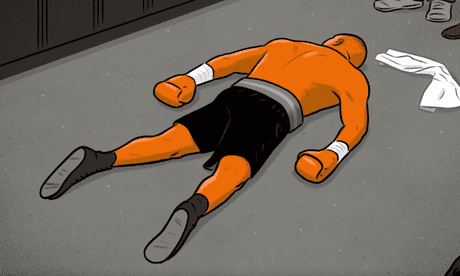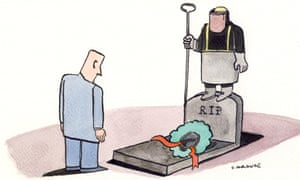'People will forgive you for being wrong, but they will never forgive you for being right - especially if events prove you right while proving them wrong.' Thomas Sowell
Search This Blog
Showing posts with label winner. Show all posts
Showing posts with label winner. Show all posts
Saturday, 10 August 2024
Monday, 10 April 2023
Does winning the lottery actually ruin your life?
Contrary to popular belief, not everyone loses their friends and goes bankrupt writes Tim Harford in The FT
At the start of the graphic novel Bloke’s Progress, our everyday hero Darren Bloke isn’t coping with the everyday stresses of life. He has a tedious job, a grinding commute, squalling children and too many bills to pay. Then he wins the lottery — and his troubles truly begin.
First, Darren becomes estranged from his friends, who keep pestering him for money. He hangs out with a richer crowd but feels out of place. He divorces his wife and marries a new woman. Then she divorces him. His money is soon gone, and so, too, are his family and friends.
In Bloke’s Progress, Darren is saved by conversations with the spirit of the Victorian sage John Ruskin. (Of course!) Ruskin’s insights deserve a separate column — or a book. But Darren’s tale made me wonder: is this what happens to people who win the lottery?
A glance at the newspapers suggests that it is. The Courier Journal tells the tale of David Lee Edwards from Ashland, Kentucky. He won $27mn in 2001, spent it on drugs, fast cars and a Learjet. He was living in a storage unit within five years, and died penniless. The Guardian explains that Michael Carroll, self-proclaimed “king of chavs”, was declared bankrupt just eight years after winning nearly £10mn — while Lee Ryan ended up sleeping rough, and spending time in jail for handling stolen cars, despite winning £6.5mn. If only the spirit of John Ruskin had been there to save them all.
But while these cautionary tales offer us a moralistic narrative arc that sticks in the memory, they aren’t necessarily typical. A lot of people win big prizes on the lottery, enough to allow us to draw more subtle — and less tragic — conclusions.
First, do lottery wins estrange us from our friends? Darren Bloke’s fate seems plausible: his friends kept asking him for money, leading him to feel exploited and them to accuse him of meanness. Yet a study by Joan Costa Font of the London School of Economics and Nattavudh Powdthavee of Warwick Business School finds that people who win more than £10,000 on the lottery spend more time socialising with their friends, although less time talking to neighbours.
This result won’t come as a shock to those who read a 2016 study by Emily Bianchi and Kathleen Vohs, which found that richer Americans tended to spend less time with neighbours and family, and more with friends. The simplest explanation is that money makes it easy to socialise for pure pleasure, while reducing the need to maintain relationships for practical reasons, such as sharing childcare.
Second, do lottery winners blow their winnings and lapse into poverty? Here, myths abound; the National Endowment for Financial Education is often cited as the source for a claim that 70 per cent of lottery winners go bankrupt. The NEFE has issued a press release explaining that it has not made that claim and has no reason to believe the claim is true.
A study by the economists Scott Hankins, Mark Hoekstra and Paige Marta Skiba looked at 35,000 lottery winners in Florida, of whom 2,000 later filed for bankruptcy (that’s less than 6 per cent, not 70 per cent). The researchers did find that lottery winners were more likely to file for bankruptcy than non-winners. Perhaps that is not surprising, since lottery enthusiasts tend to be low-income, and most of them don’t win much. Hankins, Hoekstra and Skiba found that bankruptcy struck with equal likelihood whether people won less than $10,000 or more than $50,000.
These Floridian winners, then, were more likely to face bankruptcy than non-winners, but bankruptcy was still an unusual outcome. Nor did it make any difference how much they won.
Third, do lottery winners quit their jobs, as Darren Bloke did? Not according to a study of Swedish lottery winners who had won an average of 2mn Swedish kronor — roughly £200,000 — at some stage between the mid-1990s and 2005. This was about eight times the annual salary of a nurse or police officer in Sweden at the time. The researchers, Bengt Furaker and Anna Hedenus, found that some of these winners reduced their hours or took some unpaid leave, but 62 per cent carried on working exactly as before, and only 12 per cent quit their jobs completely. Either people felt that the jackpot wasn’t quite large enough to make it sensible to quit, or — perhaps more likely — they rather enjoyed their jobs. John Ruskin, who celebrated the value of honest labour, would surely have approved.
Thus far we’ve seen that lottery winners spend more time hanging out with friends, are not notably at risk of bankruptcy and often keep working in their old jobs. The big question remaining is: are they happy?
Yes, say Erik Lindqvist, Robert Östling and David Cesarini, who studied lottery winners in (again) Sweden. They find that winners of large prizes were significantly more satisfied with their lives — and in particular were significantly more satisfied with their finances. There is little sign in this data of the feckless or reckless lottery winners who squander their winnings.
The overall impression I get from these studies is that lottery winners are . . . well, rather sensible. “I won’t let it change my life,” goes the cliché, and perhaps the cliché is true.
Lottery winners typically use their money to increase their financial security and to spend more time with friends. They rarely quit their jobs. Some squander the money; most do not. Ruskin argued that money had no value unless it was wisely used. Lottery winners don’t do as badly as we might have feared.
Sunday, 20 February 2022
Thursday, 5 August 2021
Friday, 1 January 2021
Thursday, 4 April 2019
The life of a loser: what fuels our fascination with the defeated?
They say that you find the best stories in the loser’s dressing room but discovering what defeat does to a champion is not easy topic to tackle writes Andy Bull in The Guardian
There are all different sorts of pauses, and in this business the worst is the one that starts every loser’s press conference, which sometimes drags on so long you worry it’ll never end. A winner’s press conference will fly by, but the ones held by the other guy feel sort of awkward. They usually start with some inoffensive and open-ended bromide, “how are you feeling?” or “you must be disappointed?”, a painkilling platitude before we start to probe a little deeper in the wound. Or everyone will latch on to some ready explanation for what went wrong, the referee’s decision, or someone else’s poor sportsmanship, grateful for an opening that avoids the blunt confrontation of someone’s public failure.
They say that you find the best stories in the loser’s dressing room. No one is sure which grand old man of US journalism came up with that. Maybe it was Bill Heinz, maybe it was Jimmy Breslin, maybe it was Gay Talese. Sixty years later, Talese’s profile of heavyweight champion Floyd Patterson is still one of the most excruciatingly honest accounts of what defeat does to a champion athlete.

Winners are boring!
Because it’s not an easy topic to get at. “I’ve wanted so much to talk to another fighter about all this,” Patterson told Talese, “but who can you talk to? Most fighters don’t talk much anyway. And I can’t even look another fighter in the eye at a weigh-in.”
Talese opened Patterson up like a sardine tin. Patterson told him how he used to keep a fake beard, moustache, spare hat and glasses stashed in his kit bag, and how, when he lost to Sonny Liston in a first-round knockout, he put the disguise on right after the fight and wore it all the way from Chicago to New York, where he went straight to the airport. “I didn’t care what plane I boarded,” he said. “I just looked up and saw this sign at the terminal reading ‘Madrid’, and so I got on that flight after buying a ticket.”

Yutaka Take riding Haru Urara in Kochi, Japan. Photograph: Sports Nippon/Getty Images
For the next five days, Patterson pretended he was an old man with a limp. “I began to actually think I was somebody else,” he said. “And it is nice, every once in a while, being somebody else.”
Patterson was an Olympic champion at 17, won the heavyweight title once at 21, then again when he was 25, and altogether, from his first victory against Eddie Godbold at the St Nicholas Rink, and his last defeat against Muhammad Ali at Madison Square Garden, he fought 64 times, won 55, lost 8, drew 1.
And despite it all, he told Talese, he couldn’t ever shake the feeling that he was some sort of a coward. “You can be a fighter – and a winning fighter – and still be a coward,” Patterson said. That’s why he kept that disguise ready. “It’s easy to do anything in victory. It’s in defeat that a man reveals himself. In defeat I can’t face people. I haven’t the strength to say to people: ‘I did my best, I’m sorry.’”
Esquire called the piece The Loser, which was pretty damn provocative. Back at the beginning of this decade the British tennis player Robert Dee got headlines like that when he lost 54 consecutive matches in ITF/ATP events. The papers called him the worst tennis player in the world, and Dee got so annoyed that he spent the next year making everybody take back what they’d said about him, on the ground that he’d actually won a few matches in a domestic event in Spain.
Even now, Dee’s website reads like one long list of the retractions his lawyers extracted. He ended up taking the Daily Telegraph to the high court for libelbecause they wouldn’t back down. He lost. Fifty-five years later, Netflix has borrowed Talese’s title for its new documentary series, Losers, directed by Mickey Duzyj. There are some great stories, well told, among the eight he picked, such as the reluctant heavyweight Michael Bentt, who lost his world title in his very first defence, Surya Bonaly, the figure-skater who finished in second place at three successive world championships, and, inevitably, Jean van de Velde, who blew the Open on the 72nd hole.
It must have made an interesting pitch. “I’m making a show about losers and I’d like you to be in it.” Duzyj says he had “conversations” with most of the subjects before the launch, about why he’d picked such a pitiless title for the show. “Everybody gets it, mostly because of the tone with which we explored their stories.”

Floyd Patterson, the sleeping giant of boxing
And there’s the catch. Because, good as the show is, the stories all have happy endings. Duzyj calls them “noble failures”. He got interested in the topic when he made a short documentary a couple of years back about a Japanese racehorse called Haru Urara, who lost 113 races in a row. Haru Urara became such a popular underdog that people bet more than $1m on his 100th race, which saved his home track from going bankrupt. “Given the ruthlessness of American culture and the surprising wisdom that came from the Japanese story,” Duzyj says: “I thought it’d be interesting to explore a series of international ‘noble failures’ and see what we all could learn from them.”
It feels like Duzyj flinched, that he felt he had to spin a little sugar in to sweeten the mix. But then when you’re talking to losers, maybe that’s the way it needs to be – and maybe, too, it’s the way we want to think it is. Like Patterson said: “I was the fighter who got knocked down the most, but I also got up the most.”
There are all different sorts of pauses, and in this business the worst is the one that starts every loser’s press conference, which sometimes drags on so long you worry it’ll never end. A winner’s press conference will fly by, but the ones held by the other guy feel sort of awkward. They usually start with some inoffensive and open-ended bromide, “how are you feeling?” or “you must be disappointed?”, a painkilling platitude before we start to probe a little deeper in the wound. Or everyone will latch on to some ready explanation for what went wrong, the referee’s decision, or someone else’s poor sportsmanship, grateful for an opening that avoids the blunt confrontation of someone’s public failure.
They say that you find the best stories in the loser’s dressing room. No one is sure which grand old man of US journalism came up with that. Maybe it was Bill Heinz, maybe it was Jimmy Breslin, maybe it was Gay Talese. Sixty years later, Talese’s profile of heavyweight champion Floyd Patterson is still one of the most excruciatingly honest accounts of what defeat does to a champion athlete.

Winners are boring!
Because it’s not an easy topic to get at. “I’ve wanted so much to talk to another fighter about all this,” Patterson told Talese, “but who can you talk to? Most fighters don’t talk much anyway. And I can’t even look another fighter in the eye at a weigh-in.”
Talese opened Patterson up like a sardine tin. Patterson told him how he used to keep a fake beard, moustache, spare hat and glasses stashed in his kit bag, and how, when he lost to Sonny Liston in a first-round knockout, he put the disguise on right after the fight and wore it all the way from Chicago to New York, where he went straight to the airport. “I didn’t care what plane I boarded,” he said. “I just looked up and saw this sign at the terminal reading ‘Madrid’, and so I got on that flight after buying a ticket.”

Yutaka Take riding Haru Urara in Kochi, Japan. Photograph: Sports Nippon/Getty Images
For the next five days, Patterson pretended he was an old man with a limp. “I began to actually think I was somebody else,” he said. “And it is nice, every once in a while, being somebody else.”
Patterson was an Olympic champion at 17, won the heavyweight title once at 21, then again when he was 25, and altogether, from his first victory against Eddie Godbold at the St Nicholas Rink, and his last defeat against Muhammad Ali at Madison Square Garden, he fought 64 times, won 55, lost 8, drew 1.
And despite it all, he told Talese, he couldn’t ever shake the feeling that he was some sort of a coward. “You can be a fighter – and a winning fighter – and still be a coward,” Patterson said. That’s why he kept that disguise ready. “It’s easy to do anything in victory. It’s in defeat that a man reveals himself. In defeat I can’t face people. I haven’t the strength to say to people: ‘I did my best, I’m sorry.’”
Esquire called the piece The Loser, which was pretty damn provocative. Back at the beginning of this decade the British tennis player Robert Dee got headlines like that when he lost 54 consecutive matches in ITF/ATP events. The papers called him the worst tennis player in the world, and Dee got so annoyed that he spent the next year making everybody take back what they’d said about him, on the ground that he’d actually won a few matches in a domestic event in Spain.
Even now, Dee’s website reads like one long list of the retractions his lawyers extracted. He ended up taking the Daily Telegraph to the high court for libelbecause they wouldn’t back down. He lost. Fifty-five years later, Netflix has borrowed Talese’s title for its new documentary series, Losers, directed by Mickey Duzyj. There are some great stories, well told, among the eight he picked, such as the reluctant heavyweight Michael Bentt, who lost his world title in his very first defence, Surya Bonaly, the figure-skater who finished in second place at three successive world championships, and, inevitably, Jean van de Velde, who blew the Open on the 72nd hole.
It must have made an interesting pitch. “I’m making a show about losers and I’d like you to be in it.” Duzyj says he had “conversations” with most of the subjects before the launch, about why he’d picked such a pitiless title for the show. “Everybody gets it, mostly because of the tone with which we explored their stories.”

Floyd Patterson, the sleeping giant of boxing
And there’s the catch. Because, good as the show is, the stories all have happy endings. Duzyj calls them “noble failures”. He got interested in the topic when he made a short documentary a couple of years back about a Japanese racehorse called Haru Urara, who lost 113 races in a row. Haru Urara became such a popular underdog that people bet more than $1m on his 100th race, which saved his home track from going bankrupt. “Given the ruthlessness of American culture and the surprising wisdom that came from the Japanese story,” Duzyj says: “I thought it’d be interesting to explore a series of international ‘noble failures’ and see what we all could learn from them.”
It feels like Duzyj flinched, that he felt he had to spin a little sugar in to sweeten the mix. But then when you’re talking to losers, maybe that’s the way it needs to be – and maybe, too, it’s the way we want to think it is. Like Patterson said: “I was the fighter who got knocked down the most, but I also got up the most.”
Sunday, 17 March 2019
Why we should be honest about failure
Disappointment is the natural order of life. Most people achieve less than they would like writes JANAN GANESH in The FT
On a long-haul flight, Can You Ever Forgive Me? becomes the first film I have ever watched twice in immediate succession. Released last month in Britain, it recounts the (true) story of Lee Israel, a once-admired, now-marginal writer who resorts to literary forgery to make the rent on her fetid New York hovel. Her one friend is himself a washout who, as per the English tradition, passes off his insolvency as bohemia. Lee pleads with her agent to answer her calls and, in the rawest scene, confesses her crime with a wistful pang for the success it brought her.
There are serviceable jokes (including the profane farewell between the two friends) but the film is ultimately about failure: social, financial, romantic, professional. Put it down to the lachrymose effects of air travel — a phenomenon that has no definitive explanation — but I found the film unusually affecting. Or perhaps it was the shock of seeing failure addressed so unsentimentally, and from so many angles.
Failure — not spectacular failure, but failure as gnawing disappointment — is the natural order of life. Most people will achieve at least a little bit less than they would have liked in their careers. Most marriages wind down from intense passion to a kind of elevated friendship, and even this does not count the roughly four in 10 that collapse entirely. Most businesses fail. Most books fail. Most films fail.
You would hope that something so endemic to the human experience would be constantly discussed and actively prepared for. Instead, what we hear about is failure as a great “teacher”, or as a staging post before eventual success. There are management books about “failing forward”. There are educational methods that teach children the uses of failure. Consult an anthology of quotations about the subject, and it is not just the Paulo Coelho types who sugar-coat it. Churchill, Edison, Capote, at least one Roosevelt: people who should know better almost deny the existence of failure as anything other than a character-building phase.
There are good intentions behind all this. There is also a lot of naivety and squeamishness. For many people, failure will be just that, not a nourishing experience or a bridge to something else. It will be a lasting condition, and it will sting a fair bit.
Our seeming inability to look this fact in the eye is not just unbecoming in and of itself, it also inadvertently makes the experience of failure more harrowing than it needs to be. By reimagining it as just a holding pen before ultimate triumph, those who find themselves stuck there must feel like aberrations, when their experience could not be more banal.
I have known lots of Lee Israels: sensations at 25, under-achievers at 40. Sometimes, there was an identifiable wrong turn — a duff career move, say, or the pram in the hallway. But in most cases, it was just the law of numbers doing its impersonal work.
In almost all professions, there are too few places at the top for too many hopefuls. Lots of blameless people will miss out. Whether at school or through those excruciating management guides, a wiser culture would not romanticise failure as a means to success. It would normalise it as an end.
Look again at that list of names who have minted smarmy epigrams about the utility of failure. It is, you realise, a kind of winner’s wisdom. Those who overcome setbacks to achieve epic feats tend to universalise their atypical experience. Amazingly bad givers of advice, they encourage people to proceed with ambitions that are best sat on, and despise “quitters” when quitting is often the purest common sense.
At the end of Can You Ever Forgive Me?, Lee is an unambiguous failure. There is (and you will excuse the spoilers) no rapprochement with an ex-lover she is plainly not over. There is no conquest of her drink habit. The film could dwell on the real-life Lee’s successful memoir, on which it is based, but only mentions it in text as the screen goes dark. She loses her solitary friend to illness. Even the cat croaks. Why, then, is the film so moreish as to demand an instant repeat over the Atlantic? It is, I think, the honest ventilation of a universal human subject. It is the novelty of being treated as a grown-up.
On a long-haul flight, Can You Ever Forgive Me? becomes the first film I have ever watched twice in immediate succession. Released last month in Britain, it recounts the (true) story of Lee Israel, a once-admired, now-marginal writer who resorts to literary forgery to make the rent on her fetid New York hovel. Her one friend is himself a washout who, as per the English tradition, passes off his insolvency as bohemia. Lee pleads with her agent to answer her calls and, in the rawest scene, confesses her crime with a wistful pang for the success it brought her.
There are serviceable jokes (including the profane farewell between the two friends) but the film is ultimately about failure: social, financial, romantic, professional. Put it down to the lachrymose effects of air travel — a phenomenon that has no definitive explanation — but I found the film unusually affecting. Or perhaps it was the shock of seeing failure addressed so unsentimentally, and from so many angles.
Failure — not spectacular failure, but failure as gnawing disappointment — is the natural order of life. Most people will achieve at least a little bit less than they would have liked in their careers. Most marriages wind down from intense passion to a kind of elevated friendship, and even this does not count the roughly four in 10 that collapse entirely. Most businesses fail. Most books fail. Most films fail.
You would hope that something so endemic to the human experience would be constantly discussed and actively prepared for. Instead, what we hear about is failure as a great “teacher”, or as a staging post before eventual success. There are management books about “failing forward”. There are educational methods that teach children the uses of failure. Consult an anthology of quotations about the subject, and it is not just the Paulo Coelho types who sugar-coat it. Churchill, Edison, Capote, at least one Roosevelt: people who should know better almost deny the existence of failure as anything other than a character-building phase.
There are good intentions behind all this. There is also a lot of naivety and squeamishness. For many people, failure will be just that, not a nourishing experience or a bridge to something else. It will be a lasting condition, and it will sting a fair bit.
Our seeming inability to look this fact in the eye is not just unbecoming in and of itself, it also inadvertently makes the experience of failure more harrowing than it needs to be. By reimagining it as just a holding pen before ultimate triumph, those who find themselves stuck there must feel like aberrations, when their experience could not be more banal.
I have known lots of Lee Israels: sensations at 25, under-achievers at 40. Sometimes, there was an identifiable wrong turn — a duff career move, say, or the pram in the hallway. But in most cases, it was just the law of numbers doing its impersonal work.
In almost all professions, there are too few places at the top for too many hopefuls. Lots of blameless people will miss out. Whether at school or through those excruciating management guides, a wiser culture would not romanticise failure as a means to success. It would normalise it as an end.
Look again at that list of names who have minted smarmy epigrams about the utility of failure. It is, you realise, a kind of winner’s wisdom. Those who overcome setbacks to achieve epic feats tend to universalise their atypical experience. Amazingly bad givers of advice, they encourage people to proceed with ambitions that are best sat on, and despise “quitters” when quitting is often the purest common sense.
At the end of Can You Ever Forgive Me?, Lee is an unambiguous failure. There is (and you will excuse the spoilers) no rapprochement with an ex-lover she is plainly not over. There is no conquest of her drink habit. The film could dwell on the real-life Lee’s successful memoir, on which it is based, but only mentions it in text as the screen goes dark. She loses her solitary friend to illness. Even the cat croaks. Why, then, is the film so moreish as to demand an instant repeat over the Atlantic? It is, I think, the honest ventilation of a universal human subject. It is the novelty of being treated as a grown-up.
Wednesday, 28 October 2015
Why don’t we save our steelworkers, when we’ve spent billions on bankers?
Aditya Chakrabortty in The Guardian

‘Britain is entering the early stages of yet another industrial catastrophe.’ Illustration by Andrzej Krauze
Every so often a society decides which of its citizens really matter. Which ones get the star treatment and the big cash handouts – and which get shoved to the bottom of the pile and penalised. These are the big, rough choices post-crash Britain is making right now.
A new hierarchy is being set in place by David Cameron in budget after austerity budget. Wealthy pensioners: winners. Young would-be homeowners: losers. Millionaires see their taxes cut to 45%, while the working poor pay a marginal tax rate of 80%. Big business gets to write its own tax code; benefit claimants face harsh sanctions.
When the contours of this new social order are easy to spot, they can cause public uproar – as with the cuts to tax credits. Elsewhere, they’re harder to pick out, though still central. It is into this category that the crisis in the British steel industry falls.
Every so often a society decides which of its citizens really matter. Which ones get the star treatment and the big cash handouts – and which get shoved to the bottom of the pile and penalised. These are the big, rough choices post-crash Britain is making right now.
A new hierarchy is being set in place by David Cameron in budget after austerity budget. Wealthy pensioners: winners. Young would-be homeowners: losers. Millionaires see their taxes cut to 45%, while the working poor pay a marginal tax rate of 80%. Big business gets to write its own tax code; benefit claimants face harsh sanctions.
When the contours of this new social order are easy to spot, they can cause public uproar – as with the cuts to tax credits. Elsewhere, they’re harder to pick out, though still central. It is into this category that the crisis in the British steel industry falls.

Tata Steel confirms 1,200 job losses as industry crisis deepens
It would be easy to tune out the past few weeks’ headlines about plant closures and job losses as just another story of business disaster. But what’s happening to our steelworkers, and what we do to protect them, goes to the heart of the debate about which people – and which places – count in Britain’s political economy.
If Westminster lets the UK’s steel industry die, it’s in effect declaring that certain regions and the people who live and work in them are surplus to requirements. That it really doesn’t matter if Britain makes things. That the phrase “skilled working-class jobs” is now little more than an oxymoron. That’s the criteria against which to judge MPs, as they continue to take evidence today on the crisis and then debate options.
What does this crisis look like? Imagine coming to work on a September morning – only to find that you and one in six other employees in your entire industry face redundancy before Christmas. That’s the prospect facing British steelworkers. Motherwell, Middlesbrough, Scunthorpe: some of the most kicked-about places in de-industrialised Britain now face more punishment.
Mothball the SSI plant in Redcar and it’s not just 2,200 workers that you send to the dole office and whose families you shove on the breadline. An entire local economy goes on life support: the suppliers of parts, the outside engineers who used to do the servicing, the port workers and hauliers, the cafes and shops. Within days of SSI’s closure, one of Teesside’s biggest employment agencies went into liquidation.

‘If Westminster lets the UK’s steel industry die, it’s effectively declaring that certain regions and the people who live and work in them are surplus to requirements.’ Photograph: Nigel Roddis/Reuters
Steel is a fundamental part of manufacturing, so that the closure of a handful of steelworks in Scotland and the north endangers businesses in Derby and Walsall. At the West Midlands Economic Forum, the chief economist Paul Forrest calculates that about 260,000 jobs in the Midlands rely on steel for everything from basic metals to car assembly and aerospace engineering. He believes that the closures at Tata, SSI and Caparo leave 52,000 local manufacturing workers at direct risk of losing their jobs within the next five years. That’s just after the past few weeks – the UK Steel director Gareth Stace thinks that more plants face closure “within months”.
Join up these predictions, and Britain is entering the early stages of yet another industrial catastrophe. It could finally sink a sector, steel, that actually helps reduce the country’s gaping trade deficit. With that will go another pocket of well-paid blue-collar jobs. Chuck in employer contributions to pensions and national insurance, and the total remuneration per SSI staffer is £40,000 a year. Just try getting such pay in a call centre or distribution warehouse, even as a manager.
Imagine what would happen if manufacturing were centred around the capital, and its executives had Downing Street on speed dial. Actually, you needn’t imagine – merely remember the meltdown of 2008. Then Gordon Brown was so desperate to save the City that the IMF estimates he propped it up with £1.2 trillion of public money. That’s the equivalent of nearly £20,000 from every man, woman and child in the country doled out to bankers in direct cash, loans and taxpayer guarantees.
That’s what the state can do when it decides a sector matters. In 2011 David Cameron stormed out of a Brussels summit rather than agree to more regulation on the City. When it comes to steel, his ministers shrug at the difficulties posed by the EU’s state-aid rules. Michael Heseltine even declares this a “good time” for Teesside’s workers to lose their jobs in Britain’s “exciting” labour market. Let them eat benefits!
True, the problems in the steel industry aren’t confined to these shores. They’re driven by a world economy coming off the boil and China dumping its excess steel output on the global market. Yet other European governments are being far more aggressive in confronting them. Italy’s prime minister, Matteo Renzi, bailed out a huge steelworks last December. Germany’s Angela Merkel ensures that steel producers are cushioned from higher energy prices.
Just how lame, by comparison, is Cameron? Here’s an example: the European commission runs a publicly funded globalisation adjustment fund that can grant over £100m a year for precisely the sort of situation British steelworkers now face. The Germans, the French, the Dutch: they’ve all drawn down many millions apiece. The British? European commission officials told me this week that they had never so much as seen an application from the UK. Here’s a giant pot of money – into which Whitehall can’t even be bothered to dip its fingers.
Once our steel capacity is gone, it’s gone – and with it goes a big chunk of what’s left of our manufacturing base. Whole swaths of the country that have only just got off their backs after Thatcher’s de-industrial revolution will be knocked to the floor all over again.
The choice is stark. Westminster can sit on its hands, pretend it can’t do anything about the supposedly free market in steel (in which the single biggest player is the Chinese Communist party), and let tens of thousands of families go to the wall. Or our political class acts as if its job is actually to protect people from market fluctuations – and keep the steel industry afloat by extended bridging loans and capital investment in return for public stakes.
A return to British Leyland? No: a far cheaper and smaller rescue than RBS and HBOS. Free-market fundamentalists will decry this as a wage subsidy to steelworkers. But the alternative is to wind up paying far more in benefits to thousands of unemployed workers and their families. Besides, the state already shells out billions in hidden wage subsidies, through the tax credits and housing benefit that taxpayers give to employees of poverty-pay firms such as Sports Direct and Amazon.
What’s being proposed here is open, transparent support to employees in normally high-paying and high-skilled jobs. To keep a vital industry from disappearing for good. And to show that it’s not just the City that matters.
Thursday, 6 June 2013
In the digital economy, we'll soon all be working for free – and I refuse
The digital economy operates as a kind of sophisticated
X Factor: someone will make it, but most won't – and the real loser is society
X Factor: someone will make it, but most won't – and the real loser is society

Mary Portas, whose company offered a week-long internship at a Westminster school auction. Photograph: Richard Young/Rex Features
Never mind checking your privilege. Flaunting those enviable privileges is where it's at. Go to any of our big cities and cash will be flowing through ponced-up restaurants nestled between Poundland and the nail bars. They even wave it in our faces.
Already at a private school that charges £7,000 a term? Then you must need a hand up the ladder. So let Mater and Pater bid as internships for Mary Portas or Fabergé are auctioned off. Not so much getting a foot in the door as crowbarring it in with money. Theirs is a world in which austerity remains an abstract idea.
Meanwhile, we have more than a million Neets in the country – young people not in work, education or training. They could do with a helping hand but they have somehow missed the boat. It hardly matters to them that the boat was the Titanic. Their older brothers and sisters have gone to college but are still in a world of part-time pub jobs. They don't have proper salaries and therefore no chance of mortgages. And, of course, in other European countries the situation is even worse.
At this point it is customary to blame the banksters. Or at least the politicians. But there is another group partly responsible for the parlous state in which we find ourselves: the digi-heads of Silicon Valley who told us everything could be kinda free. And easy. In some virtual paradise.
But it's not lovely being asked to work for free, whether you are 18 or 48. On the popular free app known as Facebook, the great music writer Barney Hoskyns put up a manifestothat struck home: he asked "freelance content providers" – be they actors, writers, musicians or photographers – to withdraw from unpaid labour. (I did that a while back – except, of course, for causes I believe in.)
But this is about more than that. It's about technology taking jobs, about what it can and can't provide. Hoskyns quotes Jaron Lanier's new book Who Owns The Future?, in which he argues: "Capitalism only works if there are enough successful people to be customers." Lanier, a computer scientist and a musician, is rightly called a visionary because he sees what is happening, when everything is live-streamed but no one knows the name of the person who made the music any more. Content is free.
Governments play up the idea that a digital future creates jobs rather than eats them up. Culturally, there is now a fantasy world of start-ups and blogs and YouTube TV where a very few people manage to make money but most work simply for "experience".
In an interview with Scott Timberg for Salon, Lanier gives a potent example: Kodak used to have "140,000 really good middle-class employees. Instagram has 13 employees, period." He describes a winner-takes-all world, with a tiny number of successful people and everyone else living on hope. "There is not a middle-class hump. It's an all-or-nothing society."
We can shrug and say it's just another industrial revolution, a move from formal to informal work, the whole "portfolio" number. But where is the social contract, then, if it "doesn't tide you over when you're sick and it doesn't let you raise kids and it doesn't let you grow old"?
The implosion of the middle class produces instability. We cannot all be freelancers for ever. Freelance work, like interning, is fine if you have the funds to manage without a regular income. That is, if you are already wealthy. But the digital economy operates as a kind of sophisticated X Factor. Someone will make it, sure. For more than 15 seconds even, maybe. But most won't. This is why Lanier says the internet may destroy the middle classes, the people who can't outspend the elite. And without that middle group, we cannot maintain a democracy.
He sees musicians and artists and journalists as canaries in the mineshaft of this new economy. Who will pay them? "Is this the precedent we want to follow for our doctors and lawyers and nurses and everybody else? Because, eventually, technology will get to everybody."
Education and healthcare farmed out to the bright-eyed tech nerds? It's already happening. We are already missing the human touch in our hospitals and schools. Gove'snew iPad-levels still cut out the creative subjects from the core – and just when we need the innovations they bring the most. Growth – the holy grail, with nearly half of all European youth unemployed – is impeded when technology eats into job security and therefore has repercussions for pensions and benefits. Those without salaried work cannot hope to support an older generation.
The creative industries, first music and now journalism, saw these changes coming too late. My children have been brought up in a world where they have to compete with those who will work for free. It is only a matter of time until we will all be asked to do the same. And I refuse.
For what is being eroded is not only actual wages but also the very idea that work must be paid for. Huge profits are being made from these so-called opportunities for our youth. But they are, in fact, the exploitation of insecurity. This is not about being anti-technology. It is about being pro-human. Technology is here and it's often great. But we must find a sustainable way of using it so that the stuff we do or make is paid for in living and not virtual wages.
Monday, 22 October 2012
What happens to a Lottery winner?
Lottery millionaires each fund six jobs a year, study shows
3,000 £1m-plus winners have created another 3,780 millionaires among family and friends and contributed £750m to GDP

Some of the National Lottery's 3,000 millionaire winners. Photograph: David Parry/PA
The balls have dropped and all six numbers match, so it's time to buy that Audi, book the holiday in the US and phone the estate agent. At least, that's what most lottery millionaires do, according to an analysis of spending and investment by jackpot winners.
Since its launch in 1994, the lottery has created 3,000 millionaires who have won more than £8.5bn in total, at an average of £2.8m each. The trickle-down effect means that between them they have created a further 3,780 millionaires among their children, family and friends, according to the forecasting consultancy Oxford Economics.
Most winners (59%) give up work straight away, but 19% carry on doing the day job and 31% do unpaid voluntary work. The good news for the economy is that 98% of winners' spending remained in the UK. Through their spending on property, vehicles and holidays, it is estimated that each winner keeps six people in a full-time job for a year.
Winners have contributed almost £750m to GDP, and generated more than £500m in tax receipts for the Exchequer. The bulk of the money went on property, with £2.72bn spent on winners' main properties, and £170m in paying off existing debt and mortgages.
Maintaining income was a priority, with £2.125bn spent on investments. Gifts to family and friends accounted for £1.17bn, and £680m was spent on cars and holidays.
The study, commissioned by Camelot to mark the 3,000 winners milestone, was based on research from 100 £1m-plus winners. It found that in total the 3,000 winners have purchased 7,958 houses or flats in the UK, or 2.7 each, spending £3.3bn. Most winners (82%) changed their main residence, spending an average £900,000.
The new home is likely to come with a hot tub, with almost a third (29%) putting that on their shopping list. A walk-in wardrobe was a must for 28%, almost a quarter (24%) opted for a property behind electric gates, and 22% had a games room, with 7% installing a snooker table.
Larger properties need maintaining, and 30% of winners employed a cleaner and 24% a gardener. A small proportion (5%) employed a beautician.
Audis were the favourite cars of 16% of winners, with Range Rovers and BMWs also popular purchases (11% each), as well as Mercedes (10%) and Land Rovers (5%). Winners spent £463m on 17,190 cars, with the average price of their favourite being £46,116.
Holidays were also a priority. The majority (68%) choose five-star hotels overseas. The US was the favoured destination for 27%, followed by the Caribbean (9%). Closer to home, however, UK caravan sales have benefited. Over the past 18 years, 10% of millionaires have bought a caravan, generating sales worth about £7.4m.
Some winners (15%) have started their own businesses, 9% have helped others to do so, and 6% have invested in or bought other people's businesses. Businesses started or supported by lottery winners employ 3,195 people, according to the study.
Andy Logan, co-analyst and author of the report, said: "The effect of a win spreads much further and wider than we anticipated. Not only does it transform the lives of friends and family, but each win has a measurable effect on the UK economy, especially with so much of it being spent in the UK. The use of each win creates a ripple effect across this generation and very often the next."
Subscribe to:
Comments (Atom)
